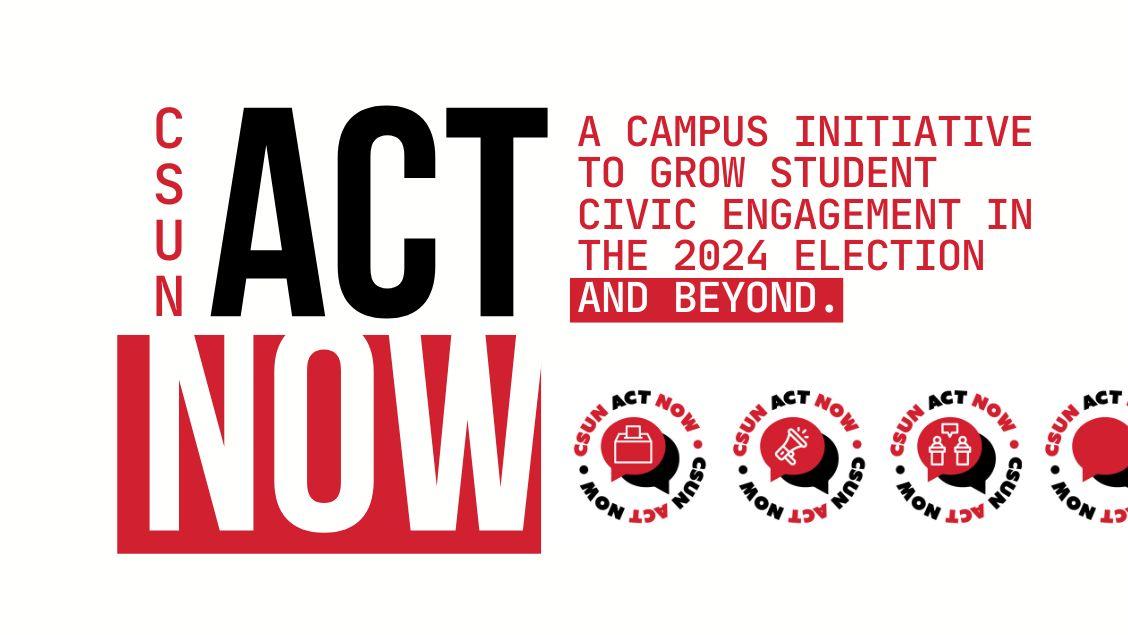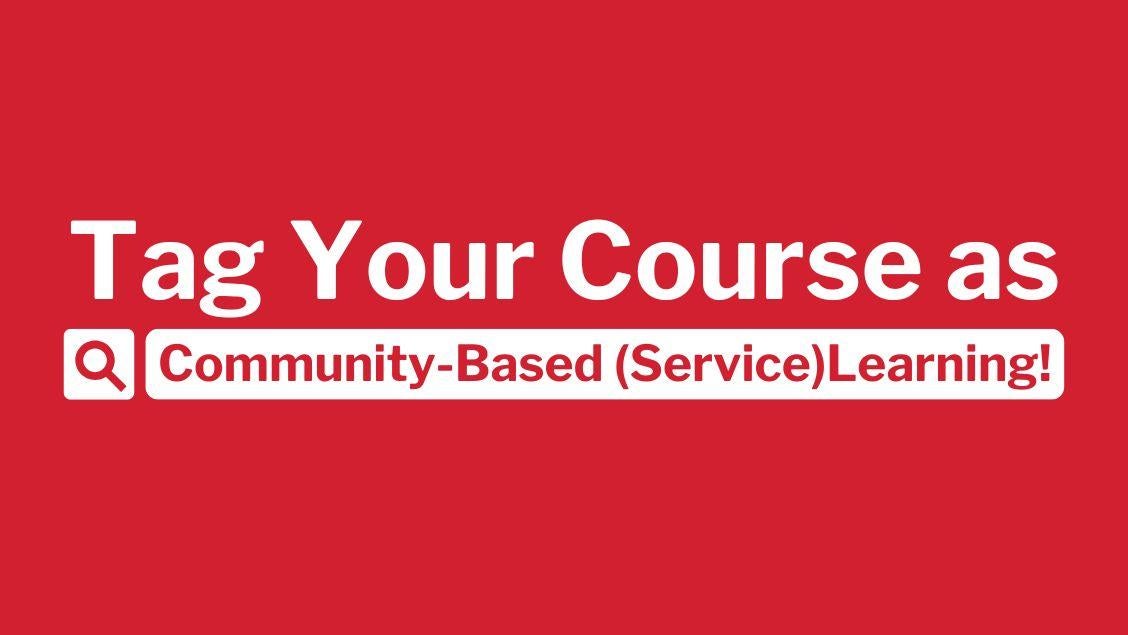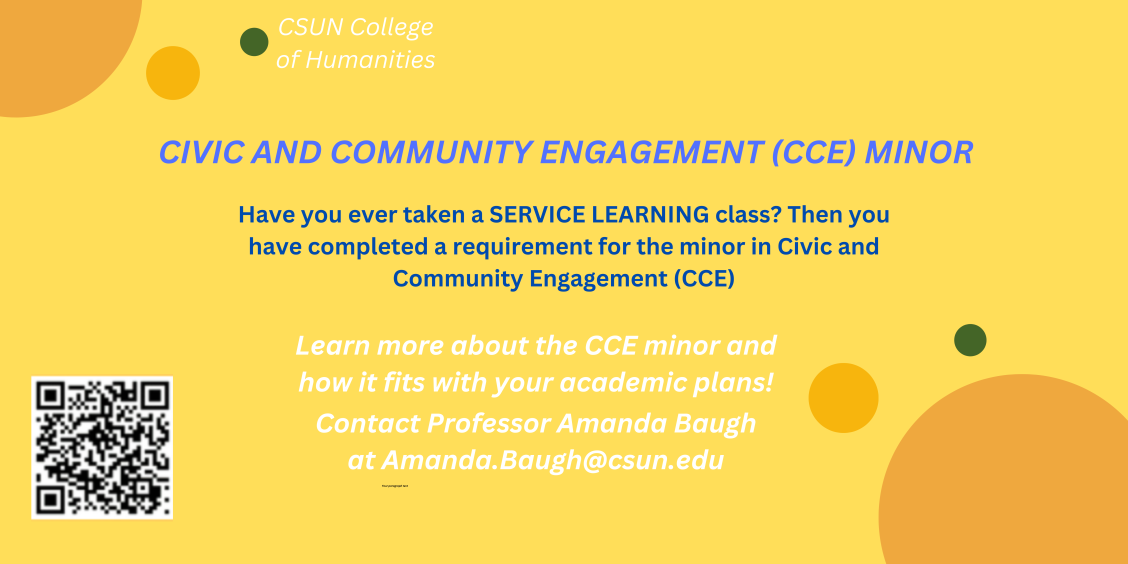
Community Engagement & CSUN Act Now

Contact your College SOLAR Coordinator

Community-Based (Service) Learning

CCE Minor
Virtual Engagement Ideas:
In some cases, students’ community-engaged work may be able to shift in ways that still meet community needs and learning outcomes. Here are a few ideas:
- conducting background research or gathering best practices or other information requested the partner(s)
- taping, recording, or streaming performances or workshops to benefit community partner(s)
- creating digital and other social media content, print program materials, or other methods for information-sharing
- undertaking assessment, evaluation, or feedback via phone or web-based services;
- offering (or compiling, researching, or brainstorming) strategies that provide indirect support from volunteers as a result of coronavirus
- conducting virtual or phone-based educational supports for youth and adults
If work with an existing partner is not possible, you may be able to find suitable opportunities through these channels:
- How to Get Involved with Virtual Volunteering
- Volunteer Match
- All For Good
- 9 PLACES TO VOLUNTEER ONLINE (AND MAKE A REAL IMPACT)
- Penpal Schools (offering free services during COVID-19)
- Americorps Teleservice Guidelines
- Omprakash - Ideas for Instruction
Stay In and Help Out! Virtual Volunteer Opportunities (from Michigan State University)
Zooniverse
Engage in virtual research from disciplines ranging from biology to literature to medicine. Anyone can become a researcher through Zooniverse—no prior experience is needed, all you need to do is sign up.
Smithsonian Digital Volunteers
Help transcribe Smithsonian collections through its Transcription Center or work to add content about the collections to Wikipedia pages through the Smithsonian Wikipedia Volunteer Program in order for these collections to become more accessible for all individuals.
Project Gutenberg
Join a network of virtual volunteers by becoming a Distributed Proofreader. Volunteers proofread individual pages of e-books to ensure the text is correct before being published electronically.
Translators without Borders
If you speak more than one language fluently, apply to help translate content for Translators without Borders (TWB). If you aren’t fluent in another language, that’s fine too! TWB needs volunteers to fill roles with website design, project management, and more.
Operation Gratitude
Help bring a little bit of home to military folks deployed by crafting handmade items and writing letters. Send thoughtful and thankful letters to the Troops, First Responders, and Emergency Medical Personnel who are out responding to the COVID-19 pandemic.
The Red Cross Digital Volunteers
Digital Volunteers for the Red Cross help its Social Engagement team when disasters occur by engaging in a variety of social media strategies to assist those who have been impacted.
Be My Eyes
This app, available for download on Android and iOS, connects visually impaired individuals with sighted volunteers via video calls for instant assistance with visual tasks.
7 Cups
7 Cups is an electronic platform that connects individuals with listener volunteers for free emotional support. The volunteer program has a training course that all interested volunteers must complete before beginning.
LibriVox
Volunteer to help create audiobooks from books in the public domain. No prior experience is necessary to start recording chapters. LibriVox records books in multiple languages, too, so no matter what language you speak, check it out.
National Parks Service Web Volunteers
Web volunteers can help the National Parks Service with testing and evaluating their web products. Check back to the site often, as projects are not always available!
Right Here at Home
Help eliminate poverty by signing up as a volunteer for Right Here at Home. The organization focuses on providing financial education and training in technology to those who live in poverty.
Missing Maps
Missing Maps is an organization that uses online volunteers to help map areas via satellite imagery and OpenStreetMap so humanitarian organizations can gather this information and better help vulnerable areas.
Free Rice
Free Rice is a website partnered with the World Food Programme that donates grains of rice for correctly answered vocabulary questions. Take 15 minutes out of your day to help donate thousands of grains of rice to people in need. Check out other games on Games for Change to learn more about social issues.
Virtual Student Federal Service
Looking to volunteer for a federal government agency like the Forest Service, National Parks Service, or CIA? Join the Virtual Student Federal Service coordinated by the U.S. Department of State. Volunteer positions open up in July and run for a full year.
United Nations Volunteers
The United Nations Volunteers platform has 100+ volunteer positions across a broad range of fields that are supported by organizations across the world, and that aim to help achieve at least one Sustainable Development Goal.
Catchafire
From one-hour phone calls to much lengthier projects, Catchafire lists hundreds of volunteering opportunities from locally- and nationally-based organizations.
Non-CBL ways to connect your course to the community (from Portland State University)
It's possible that the best option for now is to not have students directly connected to the community. If that is the case, there are many resources for exploring the concepts of community with your students. Here are just a few:
- Discuss and reflect on the notion of community and the various forms it takes (recognized 501C3 Organizations, grassroots organizations, neighbor to neighbor connections, family and friends).
- Check with the campus library to see what streaming videos they might have available to enhance the course. For example, here's a collection of Global Environmental Justice videos.
- Explore the ideas around community engagement and social justice.
- National Issues Forums has a great collection of resources that explore a variety of issues. You could have students read the materials and engage in an online discussion. The website has resources for how to structure the experience.
- https://civicreflection.org/
- What are responsibilities of Citizens?
- How should we respond in a crisis?
- Is crisis a destructive force or an opportunity for renewal?
- Everyday Democracy has a collection of downloadable resources focused on community change. This includes stories of change makers, tools, as well as a democracy and equity reading list.
- Engage students with resources from Oregon Humanities
- Educator resources and curriculum guides
- This Land: Stories of land, home, and belonging by Oregon Artists of Color
- Teach students how laws are created, help them discover who their elected officials are, have a discussion about the importance of advocating for what you believe in. Here are some basic civic education resources.
- Think about what organizations and businesses are impacted by COVID-19. Perhaps some of them would benefit from positive Google or Yelp reviews if the students have interacted with them?
Things People in Our Communities Might Need in These Times
- Healthy people who can go to the grocery store for them and doorstep deliver groceries for them
- Google Hangout/Facetime conversations to counteract the physical social isolation
- Extra craft/art supplies, books, videos for families with kids at home
- A kind note/letter to organizations serving communities of color who may be facing xenophobic reactions
- Interruption of xenophobic reactions on social media or in conversations
- Calls or emails to elected officials to advocate on behalf of needs in this time
- Check ins with folks you know are living alone and/or are isolating or in quarantine
- Notes of thanks to those in leadership roles or in positions that are not able to stay home.
Teaching Resource Links:
- Reflection questions from Loyola University Chicago Center for Experiential Learning
- Community Engaged Teaching during Suspension of Face-to-Face Classes
- Advance HE Webinar: “Utilizing Service-Learning Projects in an Online Class”
- Facing History and Ourselves Corona Virus Teachers Resource Page
- Vanderbilt's Teaching in a Time of Crisis
- CSUN's Academic Continuity Page
- CSUN's Teaching Through Disruption
- CSU's Teaching Remotely During Disruption
Digital Webinars:
- March 18, 2020 7pm EDT School Closures and Online Learning: Creating Community, Centering Students with Justin Reich, director of the MIT Teaching Systems Lab
- March 25, 2020 6pm EDT Coronavirus: Maintaining Healthy Schools and Preparing for Online Learning with AFT Director of Health Care, Kelly Trautner and AFT Director of Share My Lesson, Kelly Booz.
- March 26, 2020 4pm EDT Coronavirus: Teaching Complex Current Events and Supporting Student Well-Being with PBS NewsHour Extra and the AFT.
